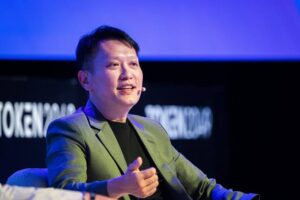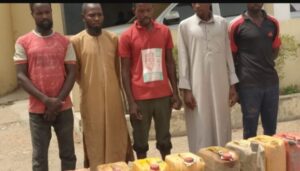Since 2015, I have been a politician on sabbatical leave with my return to mainstream journalism but privately providing strategies to politicians that ask for my service as they aspire to elective offices.
I can still recall those old good days of active politicking at Keffi, street Obalende, Lagos where the national secretariat of the now defunct National Party of Nigeria (NPN) was located.
The politicking of today seems to be more scientific, corrupted, ruthless and lacking in ideology than the politics of those hectic and stressful but proud days.
The February 25th presidential and national assembly elections were the most keenly and bitterly contested in this dispensation since 1999. The intense competitiveness of the elections was reflected in the number of states and legislative seats won by the leading political parties with Atiku Abubakar (PDP), Bola Ahmed Tinubu (APC) and Peter Gregory Obi (LP) winning in 12 states each including the Federal Capital Territory (FCT), Abuja, which was captured by Labor Party.
Engr. Rabi’u Musa Kwankwaso of the New Nigeria Peoples Party (NNPP) clean swept the votes of Kano state as widely envisaged.
The degree of competitiveness is clearly a function of the substantial credibility and integrity of the electoral process notwithstanding some of the technical hitches as well as logistical failures experienced by the umpire, INEC at the initial phases of the exercise on the polling day. Sporadic acts of violence in some areas were contained by security agencies. Hijacked Bimodal Voters Accreditation System (BVAS) machines were replaced in some areas, while some areas had none, yet the exercise was conducted and results announced, as in few areas as alleged, the elections were not even conducted but results were delivered.
The shortcomings witnessed were sufficient enough to fundamentally change or alter the ultimate outcome of the exercise. The elections largely reflected the will of the electorates in most cases while in few other cases, it was compromised.
Despite the glitches, which are understandable since there are no perfect elections anywhere in the world, those who contend that this was one of the best organized elections in this dispensation may not be wrong since it was orderly.
Indeed, the voting pattern and trend of support for the leading presidential and national assembly candidates confirmed the projections and prognostications of many analysts and pundits before the elections. Perhaps the greatest revelation of the election was the performance of Peter Gregory Obi of Labor Party.
Several analysts and members of the dominant parties had dismissed Obi as lacking in the elaborate structures needed to near a win in a national election. His party Labor has neither a serving governor, nor any seat in the national or state assembly to rely upon. It could not boast of controlling any of the 774 local government councils for take. Yet, Peter Obi won emphatically in the five South-eastern states and also recorded electoral victories in Lagos, Nasarawa, Plateau, Edo and Delta states outside his home region. Honestly, Obi had skillfully projected himself as a ‘born again’ politician with a mission to fundamentally overhaul and radically reform the prevailing system in his own way.
To those who rallied his trumpet call, it did not matter that as governor of Anambra state for eight years and running mate to Atiku Abubakar in the 2019 presidential election on the platform of PDP, Obi was part and parcel of the system he now disavowed in often trenchant language. Had Atiku won the 2019 election, Obi would have been in office as vice-president of Nigeria today and would most likely have been on the ticket of PDP in that capacity in this year’s election. Obi was an entrenched member of the subsisting system and only quit the PDP to pick the ticket of LP when it dawned on him that he could not clinch the PDP’s presidential ticket at the party primary. There is no significant difference between the values Obi stands for and the philosophical orientation of the PDP or any of the other dominant parties.
Yet, Obi is one of those who have vehemently denounced and rejected the outcome of the presidential election as well as trumpeting his intention to challenge the results in court. But if the election had been rigged against him as Obi insists, how on earth could he have won over 90% of the votes in the South-east while the other leading contenders performed abysmally in that region? Indeed, the South-east was easily the most monolithic and one-sided in terms of voting pattern while other regions were more diverse and liberal in their voting behavior. While the LP recorded 1,960, 589 votes in South-east, APC and PDP scored 127,605 and 91,195 votes respectively in same South-east. If the election was indeed rigged against him as Obi alleges, how come he defeated Tinubu’s APC in Lagos state, a party that had won every election in the state since 2015? Can it be that elections were free and fair only in those states where Obi’s Labor Party won?
Running a most divisive campaign, Obi, apart from understandably enjoying the massive support of his Igbo kith and kin, also deliberately and consciously courted and sought the Christian votes without a thought of the dangers of politicizing religion in a complex, multi-religious polity like ours. The desperation of Obi has now introduced a brand new hate into the polity and planted further mistrust between Muslims and Christians, especially in the north.
Obi was engaged in what many described as “Church Tourism”, and he made a point by attending the annual mass gathering of the mega Pentecostal Churches where he was rapturously received by some of the leading pastors openly endorsing his candidacy. This is one of the reasons why the APC’s Muslim-Muslim ticket, chosen for strategic and pragmatic electoral purposes, became a contentious issue, particularly in Christian circles. The Christian factor was thus a key consideration that swung substantial Christian votes to Obi in states like Plateau, Delta, Nasarawa, Edo and even Lagos to some extent. However, the observe side of the coin in this regard was the dismal performance of Obi in the North-west and North-east. Those pastors, who openly and threateningly projected Obi as a Christian candidate in Churches and other places, unwittingly de-marketed him in style in the core Muslim areas with substantial voting numbers.
Atiku Abubakar and his party, PDP which came second in votes score according to the doubted declared results of the polls with 6,984,520 votes, also rejected the outcome of the polls and indicated his intention to challenge the results in court.
However, Atiku could have known that there was a strong gang-up against his victory right from the onset when he emerged victorious at their party primary. Despite the lingered internal squabbles with the Nyeson Wike group of amateur politicians, there was a well calculated plan to rig the elections against an Atiku victory from the highest level with the active connivance of the election umpire that his security apparatus failed to unearth and he equally failed to understand.
If not, why was Chidi Nwafor suddenly transferred out of INEC headquarters at the close of the presidential election to a rural station outside the federal capital? What was his offence for the sudden transfer? Nwafor was an IT expert at INEC headquarters credited as the developer of the BVAS and was responsible for uploading election results to INEC web portal.
His alleged refusal to compromise cost him a sudden transfer and was replaced by one Femi Odubiyi, a onetime commissioner for Science and Technology in Lagos State, who was hurriedly recruited for Nwafor’s job. It was alleged that Femi was responsible for the criminal act of jamming the network that halted transmission of election results to INEC web portal for ease of rigging the election. This is an allegation for security agencies to verify and do the needful to save any ugly situation.
However, APC governors and other younger and more liberal elements from the North were determined that the zoning policy of rotating power between the North and South must be honored in the best interest of equity, justice and national cohesion which had a negative effect on an Atiku victory. Thus, even though Atiku had won in key northern states like Adamawa, Bauchi, Kaduna, Sokoto, Gombe, Katsina, Yobe and Taraba, the magnitude of his victory was marginal as Tinubu came a close second in many of those Northern States won by Atiku.
APC had a total number of declared votes of 1.7million to PDP’s 1.4million votes in the North-central. In the North-east, APC was said to have scored a total of 1,185,458 to PDP’s 1,741,845 votes thus coming second in that geo-political zone. And in the North-west, APC scored 2,652,233 votes to the PDP’s 2,329,540.
That notwithstanding, the PDP inexplicably went into the election as a fractured house especially with the grievances of the so called G5 governors—Benue, Oyo, Rivers, Abia and Enugu—not solved by the party and its presidential candidate. The indifference of the governors to the Atiku campaign no doubt partly contributed to the loss of the party in all the South-eastern states as well as in Rivers, Benue and Oyo states. Although he attributed his loss in the election to rigging, Atiku himself acknowledged that lack of cohesion within the ranks of the party contributed to the disappointing performance of the party but not expecting a defeat.
As he told the press, “Obi took our votes in the South-east and the South-south but that alone cannot make him president. We are ready to dialogue with Obi with a view to forming an alliance”. But such an alliance or mutual understanding should have been undertaken before the elections, and not after. Lack of cooperation and a working relationship among the leading opposition parties rather than the rigging allegation is responsible for the outcome of the elections. It is unlikely that either the APC or LP could single handedly defeat the PDP at the polls even with the advantage of the incumbency factor.
Although he was the most vilified, denigrated and relentlessly attacked by his internal and external adversaries and opponents, obviously because of his front-runner status in the race, Atiku overcame all odds and neutralized the planted landmines to triumph at the polls but denied his victory by the powers that fire the shots as opined by majority of PDP supporters and other sympathizers across party divide. His victory was truncated further demonstrates that the democracy is still in the mould of Nigeria’s undertakers.
But adding his voice, Special Assistant (Special Duties) Office of the Deputy Speaker, House of Representatives, Barrister Musa Adamu Idris had this to say: “The Almighty God created Nigeria in such a way to make it impossible for any part of the country or religion to exist without the other. The authors of our constitution also worked hard to bind the country together with provisions that will make it impossible for a section of the country and any religion for the presidency of Nigeria must have a strong Pan-Nigeria appeal and strong support and must be embraced by adherents of other religions
“Bola Ahmed Tinubu has been building bridges, friendships and forming alliances across ethnic, regional and religious lines over the years and this was reflected in the outcome of the presidential election
“Amazingly, it appears that Tinubu contested not only against candidates of other parties who were unenthusiastic about his candidature.
“Thus, how do we explain the inexplicable protracted fuel scarcity as well as the abrupt cash swap policy that has thrown hundreds of thousands of Nigerians into indescribable pain and anguish right into the election with the strong possibility that many would be angry enough to vote against our party (APC) and its candidate? But Tinubu still triumphed as declared by INEC”.
Despite the hullabaloo that ensured after results were announced and declaration made accompanied with Certificate of Return, and from the quoted analysis of Barr. Musa, this election, was the first in history since 1999, that Tinubu’s party was defeated in his strongest hold, Lagos by a less strong party, Labor while the APC won the three senate seats as well as 20 of the 24 House of Representatives seats in same Lagos state.
Another point worth a mention is the dismal performance of APC in Plateau State that produced the Director-General of the Tinubu/Shetima Presidential Campaign Council (APC-PCC), Simon Bako Lalong, the seating governor of the state.
Apart from receiving a humiliating defeat by Labor Party in the presidential election, Lalong had to contend another humiliating defeat of his tall ambition to the senate. He was defeated by the PDP in his Plateau Southern zone. So far, PDP has two of the three senators from Plateau State (Plateau North & South) as result for Plateau central zone is being awaited.
Therefore, to those who are still complaining of rigging the presidential election but silent on the outcome of the national assembly results, need to put-in some explanation on how the APC lost the presidential election in Lagos, Plateau, Kaduna, Katsina, Gombe and few other APC controlled states.
The coming March 18th gubernatorial and House of Assembly elections may be tougher than the presidential election as some governors seeking for second term or planted their stooges in contest, may be sent packing on that day as disgraced and defeated inconsequential politicians who are not desired in leadership to the dustbin of history. Surely, from all indices, Governor Bala Muhammed in Bauchi State would emerge victorious in the coming election despite the gang-up of rotten politicians with eyes glued on the public treasury for looting (warwaso) against service, and absence of any serious opponent to disturb a sleep and his first term performance scorecard that is second to none and appreciated by the majority.
Muhammad is a commentator on national issues







